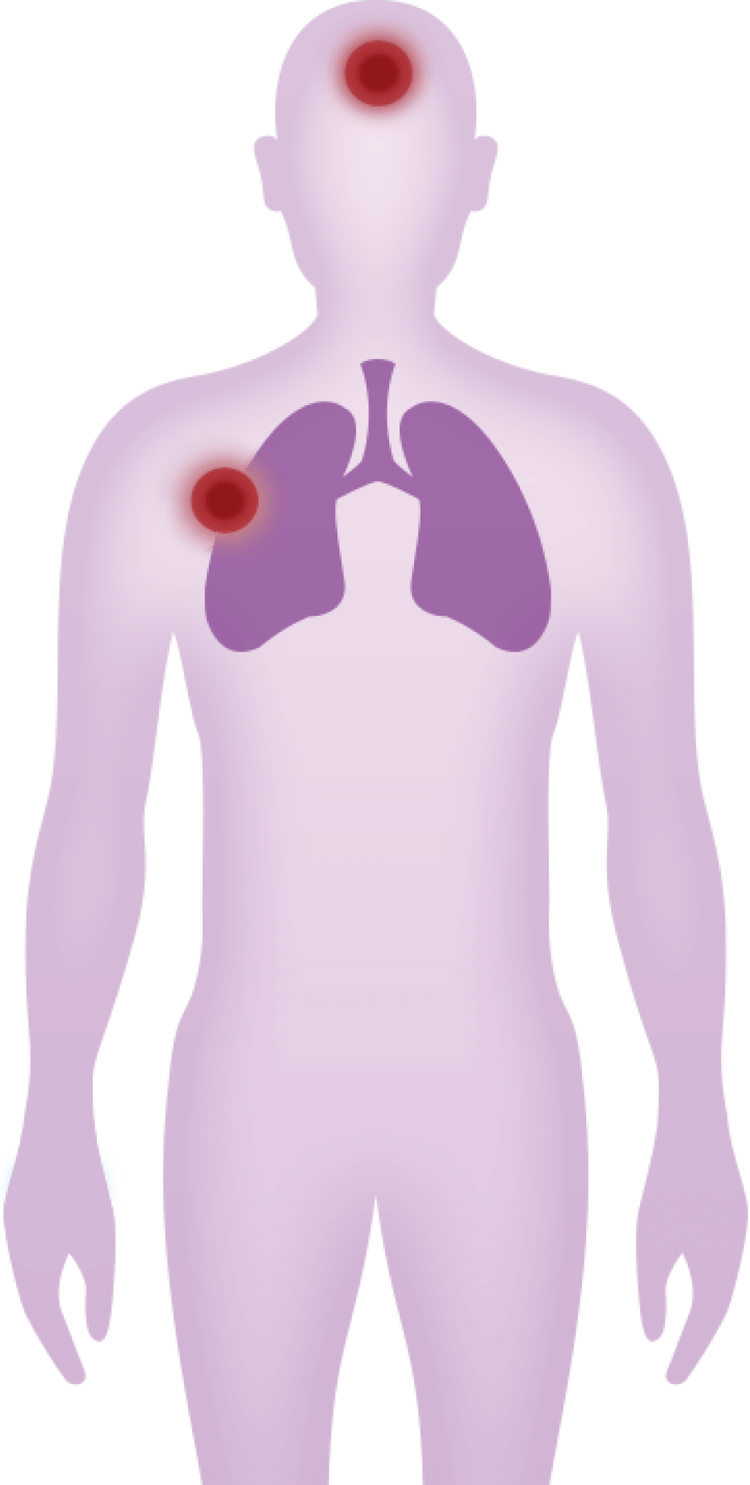
THE SYMPTOMS, CONSEQUENCES AND COMPLICATIONS OF PNEUMONIA
Pneumococcal pneumonia can cause severe symptoms, and it can take weeks before patients recover and return to their normal life.1,2
Symptoms of pneumococcal pneumonia can include3,4:
- High fever
- Chills
- Cough
- Rapid breathing or difficulty breathing
- Chest pain
For patients hospitalized with pneumonia, including pneumococcal pneumonia*5:
The average hospital stay is
more than 12 days
Every 13.6 out of 100 people
require ICU treatment
Every 13.4 out of 100 people
will need to be placed on a ventilator
The risk for hospitalization increases with age.1
Because the immune system weakens due to ageing, people aged 65 and above are at higher risk for pneumococcal pneumonia even if they are healthy.1,6
The risk for hospitalization due to pneumococcal pneumonia in people aged 65 and above is

Flu is a common infectious respiratory disease
That can lead to serious complications such as ear infections, inflammation of the heart (myocarditis), brain (encephalitis), and multiple organ failure.7–9
Similarly, pneumococcal pneumonia can also cause serious complications
Such as lung abscess, pericarditis, respiratory failure and septicemia.10,11 Patients may require hospitalization and it could take weeks to recover before returning to their normal life.1,2 Speak with your doctor now on how to help protect against pneumococcal pneumonia and the potential vaccines that may be right for you.
True or False?
Your immune system weakens as you age. Therefore, people of older age are at higher risk for pneumococcal pneumonia.
True
False
True
That’s right.
Because your immune system weakens as you age, people of older age are at higher risk for pneumococcal pneumonia.1,6 In addition, you may also be at higher risk if you are living with chronic health conditions like chronic heart disease, chronic lung disease, kidney or liver disease and diabetes.4,6
False
The truth is, your immune system does weaken with age.1,6
People of older age are hence at higher risk for pneumococcal pneumonia.1,6 In addition, you may also be at higher risk if you are living with chronic health conditions like chronic heart disease, chronic lung disease, kidney or liver disease and diabetes.4,6
References
- American Lung Association. Get the facts about pneumococcal pneumonia. Available at: www.lung.org/lung-health-diseases/lung-disease-lookup/pneumonia/pneumococcal. Accessed Jul 2023.
- American Thoracic Society. Top 20 pneumonia facts – 2019. Available at: www.thoracic.org/patients/patient-resources/resources/top-pneumonia-facts.pdf. Accessed Jul 2023.
- Centers for Disease Control and Prevention. Pneumococcal disease: Symptoms & complications. Available at: www.cdc.gov/pneumococcal/about/symptoms-complications.html. Accessed Jul 2023.
- National Foundation for Infectious Diseases. Pneumococcal disease. Available at: www.nfid.org/infectious-disease/pneumococcal/. Accessed Jul 2023.
- Ostermann, et al. BMC Pulm Med 2014;14:36.
- Centers for Disease Control and Prevention. Pneumococcal disease: Risk factors & how it spreads. Available at: www.cdc.gov/pneumococcal/about/risk-transmission.html. Accessed Jul 2023.
- Centers for Disease Control and Prevention. Influence (flu): About flu. Available at: www.cdc.gov/flu/about/index.html. Accessed Jul 2023.
- Centers for Disease Control and Prevention. Influenza (flu): What you need to know. Available at: www.cdc.gov/flu/about/keyfacts.htm. Accessed Jul 2023.
- Centers for Disease Control and Prevention. Influenza (flu): Flu symptoms & complications. Available at: https://www.cdc.gov/flu/symptoms/symptoms.htm. Accessed Jul 2023.
- Centers for Disease Control and Prevention. Pneumococcal disease: Clinical features. Available at: www.cdc.gov/pneumococcal/clinicians/clinical-features.html. Accessed Jul 2023.
- Dion CF, Ashurst JV. Streptococcus pneumoniae. Available at: www.ncbi.nlm.nih.gov/books/NBK470537/. Accessed Jul 2023.


